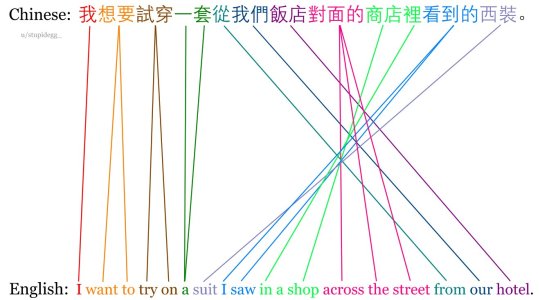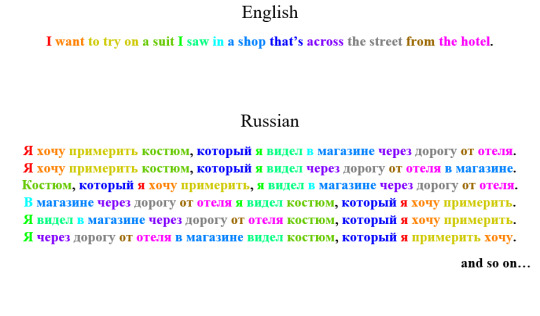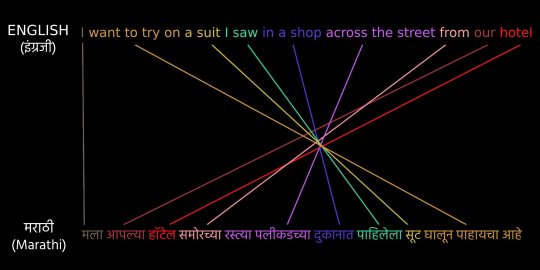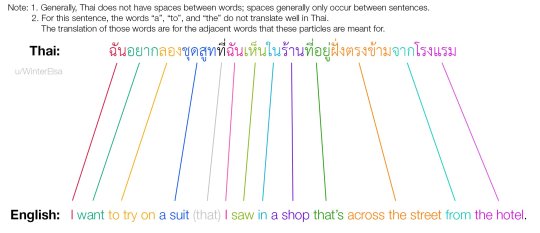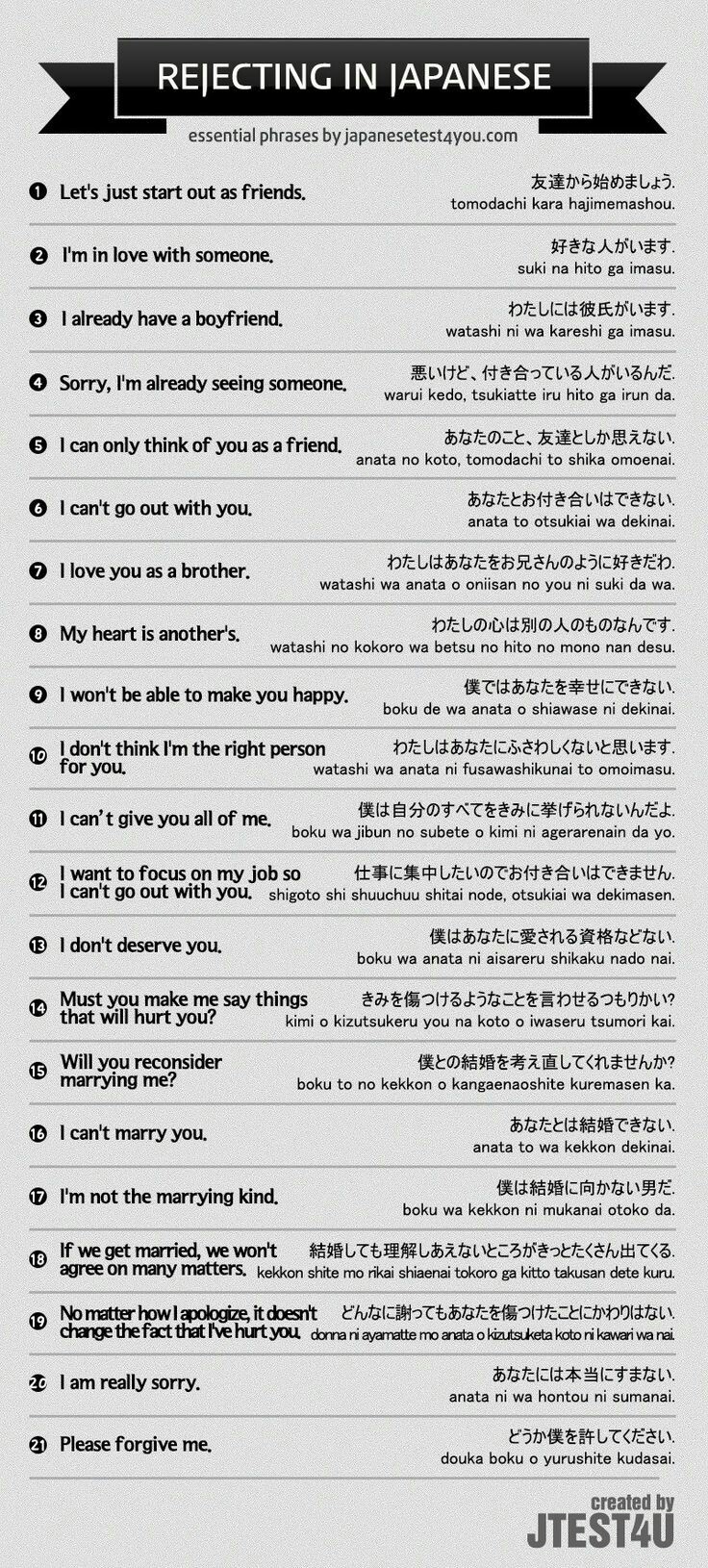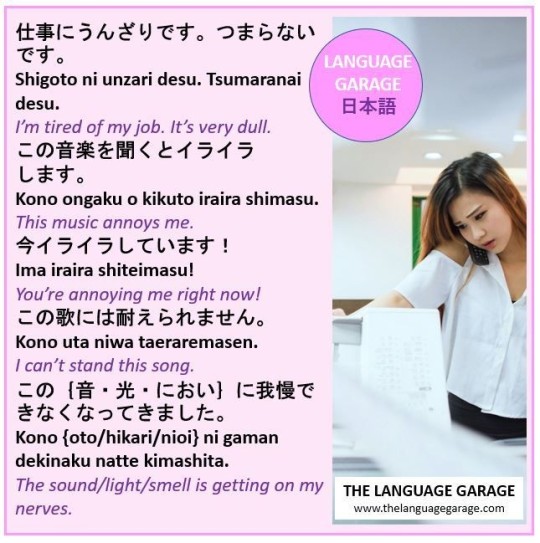Text

couldn't start my day the way i wanted it, i really struggle with my sleep schedule 😓 but it's okay, we're slowly going to get there
313 notes
·
View notes
Text

피다 (to bloom)
봄 (spring)
아름답다 (to be beautiful)
마음속 (in the heart)
비가 내리다 (to rain)
눈이 내리다 (to snow)
따뜻하다 (to be warm)
상상하다 (to imagine)
사라지다 (to disappear)
숨죽여 (quietly)
꿈꾸다 (to dream)
기다리다 (to wait)
빛나다 (to shine)
사랑하다 (to love)
희망 (hope)
여름 (summer)
가을 (autumn)
겨울 (winter)
속삭이다 (to whisper)
향기 (fragrance)
새롭다 (to be new)
추억 (memories)
잊다 (to forget)
자유롭다 (to be free)
세상 (world)
기억하다 (to remember)
미소 (smile)
비바람 (rainstorm)
멀리 (far)
함께 (together)
나무 (tree)
달리다 (to run)
날개 (wings)
피난처 (refuge)
마음 (heart)
Official Music video
Suggest a song
88 notes
·
View notes
Text
Hanja Lesson: 과
안녕하세요 여러분! Here’s another Hanja lesson that I recently posted on my Instagram–this one’s about 과! I hope it’s helpful :) 화이팅!
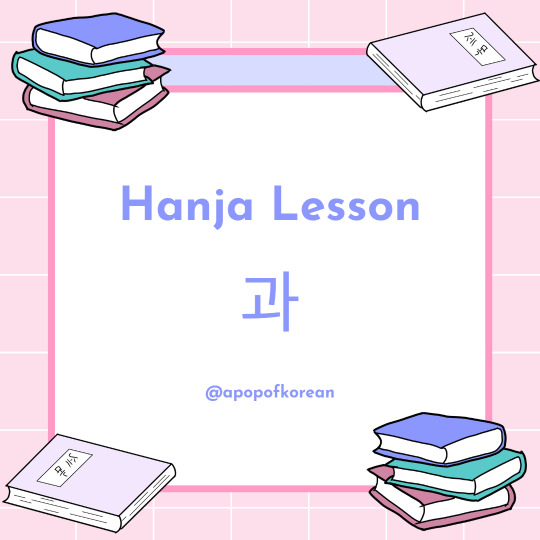



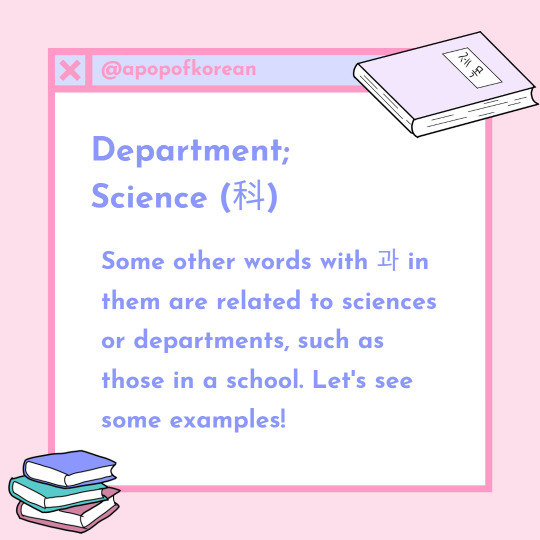
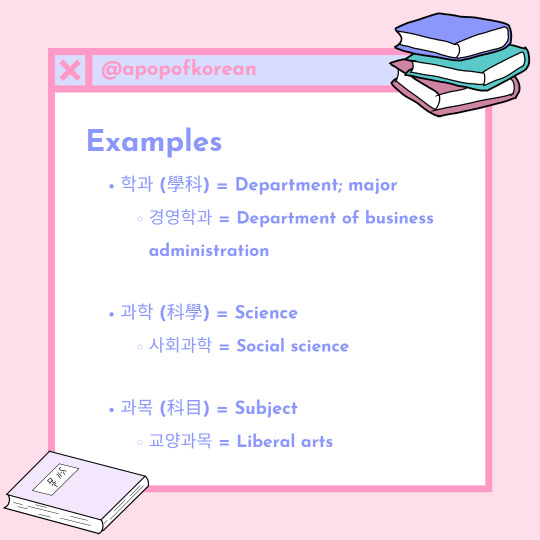


My masterlist
Join my Discord chat here to practice Korean with others!
Follow me on Instagram here for more Korean content!
Check out my Ko-Fi to support this blog and my studies! Thank you for your generosity!
93 notes
·
View notes
Text

🌸🌼🌸 30-Day Journey to Korean Language Mastery! 🌸🌼🌸
Hey there language lovers! Are you ready for an exciting adventure in learning Korean at a more intermediate level? 🇰🇷✨ In this 30-day study schedule, we'll dive into some juicy grammar topics that'll take your Korean skills to the next level. Ready to embark on this language adventure? Let's rock this 30-day challenge together! Happy studying and remember, every step counts on the road to Korean language mastery! 화이팅! 💪✨
Week 1: Verb Modification and Advanced Sentence Structures
Day 1: Time to dust off those honorifics and level up your respect game! Show some love to those verbs with various honorific verb endings.
Day 2-3: Let's express our wishes and assumptions with "았/었으면 좋겠다" (I wish I had) and "-(으)ㄹ 텐데" (I suppose, I think). Wishful thinking, here we come! 🌠
Day 4-5: No more doubts about "have to" or "can do"! Master "-아/어/여야 하다" (have to, must) and "-아/어/여도 되다" (can, may).
Day 6-7: Weave your magic into sentences with various verb modifications and advanced structures using the things you've studied the past few days.
Week 2: Subjunctive and Concessive Expressions
Day 8-9: Curiosity piqued? Delve into "-아/어/여 보다" (try to do) and "-아/어/여지다" (begin to do). Adventure awaits! 🚀
Day 10-11: Unveil the power of "even if" with "-더라도" and the allure of "either" with "-든지".
Day 12-13: Embrace "no matter how much someone says" with "아무리~-(으)라고 해도" and the certainty of "regardless of" with "-든간에".
Day 14: Take a deep breath and look back on the amazing grammar points we've conquered so far! You're soaring to new heights! 🦅
Week 3: Advanced Particles and Connectives
Day 15-16: Adventure calls! Set out on "-을 테니까" (since I will) and navigate "-느라고" (because of, due to).
Day 17-18: Embrace the twists and turns of "-를 지경이다" (to the extent of) and "-는바람에" (because of, on account of). The path may be challenging, but you're up for it!
Day 19-20: "Even if it's tough, let's do it!" Dive into "-아/어/여서라도" and "might have to do" with "-아/어/여야 할지도 모르다".
Day 21: Let's take a moment to bask in the glory of the grammar points we've mastered in Week 1 to Week 3. Proud language learners unite! 🌟
Week 4: Expressing Intention and Assumptions
Day 22-23: Master the art of expressing intentions with "기로 하다" (decide to do) and "으려던 참이다" (was about to do). Your plans are set in motion!
Day 24-25: Delve into assumptions with "ㄴ/는다고 하다" (heard that) and "ㄹ/을 것 같다" (seems like). The mystery unfolds! 🔍
Day 26-27: Let's get speculative with "것 같으면서" (while feeling like) and "나니까" (since, because). The intrigue continues! 🕵️♂️
Day 28: Embrace your linguistic prowess as you navigate the subtleties of intention and assumptions. Let's recap the past few days!
Week 5: Advanced Particles and Expressions
Day 29-30: Explore the nuances of "만에 하다" (to do after a long time) and "아니면서도" (although, even though). Time to fine-tune your expressions!
Day 31: Reflect on your incredible progress and pat yourself on the back for conquering advanced grammar structures. You've come so far, and there's no stopping you now! 🎉
225 notes
·
View notes
Text
Linguistics Terms Vocab
我日后要能关于语言学说话,所以这儿有长的术语单子。:)
语言学 yǔyánxué - (n.) linguistics
语言 yǔyán - (n.) language
言语 yányǔ - (n.) speech
哑语/手语 yǎyǔ/shǒuyǔ - (n.) sign language
方言 fāngyán - (n.) dialect
语音学 yǔyīnxué - (n.) phonetics
声音 shēngyīn - (n.) sound
共振峰 gòngzhènfēng - (n.) vowel formant
时频谱 shípínpǔ - (n.) spectrogram (also 频谱图)
波形 bōxíng - (n.) waveform
声学 shēngxué - (n.) acoustics
语音转录 yǔyīnzhuǎnlù - (n.) phonetic transcription
音系学 yīnxìxué - (n.) phonology (also 音韵学,音位学)
音位 yīnwèi - (n.) phoneme
音段 yīnduàn - (n.) segment
音位变体 yīnwèibiàntǐ - (n.) allophone, phonemic variant
语调 yǔdiào - (n.) intonation
重读 zhòngdú - (n.) stress (also 重音)
音位对立 yīnwèiduìlì - (n.) phonemic contrast
语音组合法 yǔyīnzǔhéfǎ - (n.) phonotactic
实验室音系学 shíyànshìyīnxìxué - (n.) laboratory phonology
优选论 yōuxuǎnlùn - (n.) Optimality Theory
词法学 cífǎxué - (n.) morphology (also 形态学,构词学)
词素/语素 císù/yǔsù - (n.) morpheme
派生变化 pàishēngbiànhuà - (n.) derivation
屈折变化 qūzhébiànhuà - (n.) inflection
合成词 héchéngcí - (n.) compound word
句法学 jùfǎxué - (n.) syntax
名词 míngcí - (n.) noun
动词 dòngcí - (n.) verb
形容词 xíngróngcí - (n.) adjective
副词 fùcí - (n.) adverb
句子 jùzi - (n.) sentence
主语 zhǔyǔ - (n.) subject (also 主词)
宾语 bīnyǔ - (n.) object (also 受词)
语义学 yǔyìxué - (n.) semantics
意义 yìyì - (n.) meaning
歧义 qíyì - (n.) ambiguity
前设 qiánshè - (n.) presupposition
蕴涵 yùnhán - (n.) entailment
语用学 yǔyòngxué - (n.) pragmatics
语境 yǔjìng - (n.) context
社会语言学 shèhuìyǔyánxué - (n.) sociolinguistics (社会 - society)
社会方言 shèhuìfāngyán - (n.) sociolect
社会阶级 shèhuíjiējí - (n.) social class
语域 yǔyù - (n.) register
语码转换 yǔmǎzhuǎnhuàn - (n.) code-switching
语言群落 yǔyánqúnluò - (n.) speech community
标准方言 biāozhǔnfāngyán - (n.) standard variety/dialect
历史语言学 lìshǐyǔyánxué - (n.) historical linguistics (历史 - history)
语言变化 yǔyánbiànhuà - (n.) language change
拟音 nǐyīn - (v.) reconstruct a sound system
重建 chóngjiàn - (v.) reconstruct
历史比较语言学 lìshǐbǐjiàoyǔyánxué - (n.) comparative linguistics
比较法 bǐjiàofǎ - (n.) comparative method
语源 yǔyuán - (n.) etymology
祖语 zǔyǔ - (n.) proto-language
心理语言学 xīnlǐyǔyánxué - (n.) psycholinguistics
语言习得 yǔyánxídé - (n.) language acquisition
普遍文法 pǔbiànwénfǎ - (n.) universal grammar
关键期 guānjiànqī - (n.) critical period
先天论 xiāntiānlùn - (n.) nativism
行为论 xíngwéilùn - (n.) behaviorism (also 行为主义)
语言接触学 yǔyánjiēchùxué - (n.) contact linguistics (接触 - contact)
皮钦语 píqīnyǔ - (n.) pidgin
克里奥尔语 kèlǐ'ào'ěryǔ - (n.) creole
底层 dǐcéng - (n.) substrate
顶层 dǐngcéng (n.) superstrate
顶层 dǐngcéng - (n.) superstrate
頂层 dǐngcéng - (n.) superstrate
49 notes
·
View notes
Link
Found this extremely handy vocab list/grammar guide for Japanese learners who might be interested in trying Japanese yoga videos or a yoga class in Japan! I’ll definitely be finding this useful in the future!
60 notes
·
View notes
Text
7 intermediate/advanced Chinese grammar fundamentals
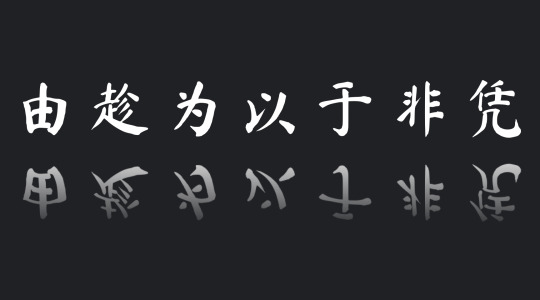
I’ve been meaning to write more posts focusing on advanced grammar for a while. So let’s look at 7 characters I’ve selected and some (but not necessarily all) of their key usages.
I consider this content to be upper-intermediate/advanced because I don’t think you’d learn it until at least a 3rd-year college Chinese course. I consider these usages to be fundamental because I encounter them on the regular basis in native content, so you need to have a good grasp on them.
1) 由 yóu
由 yóu - by, via, through / from
这个钱该由我付。
This money should be paid by me.
这件事由他处理。
This matter is handled by him.
现场播放的歌曲由你来决定。
The song(s) that is played live is decided by you.
句子是由词组成的。
Sentences are made from/of words.
2) 趁 chèn
趁 chèn - to avail oneself of / to take advantage of
这碗面趁热吃吧。
Eat this bowl of noodles while it’s hot.
我想趁这个机会讲几句话。
I want to take this opportunity to say a few words.
趁着年轻我们要多学点儿知识。
We need to learn more while we are young.
3) 为 wéi
为 wéi - as (in the capacity of) / to take sth as / to act as / to serve as / to behave as / to become / to be
我们选她为代表。
We chose her as our representative.
我把他视为好朋友。
I consider him to be a good friend.
这条街被命名为平安大街。
The street was named (as) Ping'an Street.
总面积为78平方米。
The total area is 78 square meters.
最高票数为4千票。
The highest number of votes is 4,000 votes.
4) 以 yǐ
以 yǐ - to use / by means of / in order to
他们以期待的目光迎接我的到来。
They greeted me with expectant eyes.
我们也将以正确的方式进行处理。
We will use the proper method to handle things.
联系我们以了解更多信息。
Contact us (in order) to learn more.
这是他以集体的名义作出的决定。
This is a decision he made in the name of the collective.
人们不仅仅以个人的身份生活。
People don’t just live as individuals.
5) 于 yú
于 yú - (of time or place) in, at, on / (indicating any indirect relation) to, toward, vis-à-vis, with regard to, for / (indicating a source) from, out of / (used in comparison) than
他出生于香港。
He was born in Hong Kong.
他出生于1995年12月13日。
He was born on December 13, 1995.
第一次世界大战爆发于1941年。
World War I broke out in 1941.
他毕业于北京大学。
He graduated from Peking University.
他有很多事情还需要求助于父母。
There are many things for which he still needs to request help from his parents.
吃坚果有利于心脏健康。
Eating nuts is good for heart health.
写日记有助于缓解压力和焦虑。
Writing a journal is helpful for relieving stress and anxiety.
这座楼高于那座楼。
This building is taller than that building.
6) 非 fēi
非 fēi - to insist on, simply must
我非要去不可。
I must go.
学好语言非得下功夫不行。
To learn a language, one has to put in work.
他不想来就算了,为什么非叫他来?
It’s fine if he doesn’t want to come, why insist on him coming?
7) 凭 píng
凭 píng - on the basis of
人们常常凭着直觉去判断和做事。
People often judge and act based on intuition.
可是凭经验做事,真的靠谱吗?
But is it really reliable to do things based on experience?
你凭什么这么说?
On what basis do you say that?
他凭什么得诺贝尔和平奖?
On what basis did he get the Nobel Peace Prize?
PS: I just noticed that Google Slides has added some simplified Chinese fonts! Previously I had to use Japanese fonts, so some characters were not supported. I made this post’s header image in Google Slides.
See past similar posts:
Learning to read formal Chinese
5 constructions to take your Chinese to the next level
312 notes
·
View notes
Text
Resources I'm using to learn ASL!
ASL is American Sign Language and it's a beautiful and complex visual language used primarily by Deaf and Hard of Hearing people. I've been studying it for about 3 months now and have completely fallen in love with it! My roommate and his gf both know varying levels of ASL (she's fluent and he's around my level) so it's been great to practice with them when we're able.
A lot of my language progress has been coming from youtube videos and practicing by myself (especially in a mirror or recording myself) so I wanted to share some of the resources I've found particularly helpful!
HandSpeak ASL Dictionary: This is a great database where you can look up how to sign various words
What The Deaf?! Podcast: A podcast run by two Deaf women talking about various aspects of their lives, gives some insight into Deaf culture and their lived experiences
ASL Fingerspelling Receptive Practice: They show short videos of a fingerspelled word that you then type out to see if you interpreted it correctly. Fingerspelling is a super important skill in ASL so I highly recommend practicing either with sites like this or through other resources meant for receptive practice!
Bill Vicars ASL 1 YouTube Lessons: These are more extended lessons taught entirely through sign while still being largely understandable. I recommend checking these out once you have a little more of a foundation in vocabulary so you can follow along better!
Chris Gorges ASL Basics YouTube Lessons: He gives clear and concise explanations for a lot of different concepts. I went through all of the videos in this playlist which helped me build up my vocabulary quickly
The Daily Moth YouTube Channel: They produce daily news segments signed in ASL with captions, which I’ve found is great for receptive practice and semi-immersion even though they still go quite fast for my current level
I hope some of you find these resources helpful, and it would be awesome if anyone else learning ASL could reply with some other resources you've found beneficial too!
#asl#american sign language#langblr#language learning#polyglot#language blog#languageblr#sign language#learning asl
2K notes
·
View notes
Text
How to study grammar in a foreign language
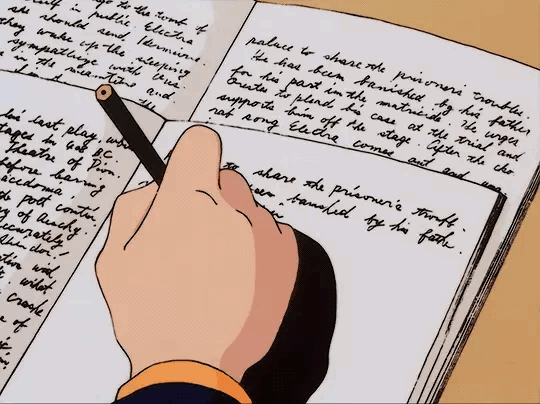
I have studied grammar in French, Spanish, Arabic, Japanese and Russian, so I’m basing this off of my experiences with that. I’m going to preface this by saying that in order to study grammar fairly quickly and effectively, you’re going to need to put the work in. Yes, you can learn grammar through conversation and making mistakes, but frankly, it will take a lot longer, and will be a lot more confusing. Grammar is hard and often boring, but it’s necessary.
Do practice questions! This is honestly your best option. Get a workbook (you can probably find loads of PDFs online, like on Z-library), and work through the questions without checking your notes.
Make your notes as minimal as you can! Just write down the essentials, which is usually the structure, when you use the structure and some example sentences. It’s tempting to write down what the textbook says word for word, but it’s a waste of time.
Make your own example sentences! Use your own vocabulary, even if it’s limited, to make your own sentences in the language. If you can do this accurately, then that’s a sign that you do know the structure.
Get corrections! You can use HiNative, or ask a native speaker. It’s important to know where you’re going wrong, so you can target your weaknesses later.
Write! This is the best, honestly. Writing is a fairly complex and necessary way of demonstrating your understanding of grammar, and it’s easy to see where you are going wrong when you write. You can use a site like Journaly to get corrections.
Do translations! Get an article or short story, and try translating a paragraph into your target language (make sure to get corrections). Look up vocabulary you don’t know, as that isn’t the most important thing in this exercise.
Drill your irregular verbs! Use flashcards, write them over and over again, however you do it, just get them stuck in your head.
Make a cheat sheet! I did this with French and it worked wonders. I recommend just doing it to review rules that you at least have a vague idea about.
Ask questions! If you have a teacher, or a native friend, ask them for help understanding grammar. You can also use online forums.
Use formulae! If you have a fairly logical brain, then it might make sense for you to write your notes using this format.
Read more! Input is EVERYTHING. Reading more books and articles in your target language will expose you more to grammar in it’s natural state, and that will really improve your grammar.
Be aware of when you use certain grammar rules! Ask questions, make your notes and practice loads. It’s really important to be solid in your knowledge of the usage of a grammar rule.
Regularly review! You can look at your notes, or do some online quizzes. Just make sure you’re regularly refreshing your memory.
Thanks for reading this post! I hope it was somewhat useful to you!
#studyblr#langblr#languages#language#language learning#grammar#learning#study#studyspo#study inspiration
1K notes
·
View notes
Text
Websites for Japanese Learners
! click on website name to be redirected !
all websites can be used for free and without subscribtion (thats why japanese101 isnt included)
-> apps for japanese learners (soon)

1. JLPT Sensei
study guides (N5-N1)
includes grammar, kanji, vocabular, adjective, verb and other lists for orientation when studying
free JLPT practice tests
2. Japanese Verb Conjugator
automatic verb conjugator
verb database
kanji database & kanji tester
over 180,000 example sentences with sound
3. Tanoshii Japanese
japanese-english dictionary (with stroke order!)
pratice games & interactive lessons (Kanji Mahjong etc.)
learning resources (japanese novel, textbook, magazine, movie recommendations)
4. Jisho
fast and smart japanese-english dictionary
draw and radical function apart from keyboard search
searching by topic and categories by adding #[topic/category]
JLPT levels, sentences, particles, counters, names included
5. Map Quiz
world map quiz in japanese
divided into continents and north, east, south and west
6. Japanesetests4you
free JLPT N5-N1 reading and listening tests
free JLPT N5-N1 vocabulary, kanji and grammar lists + tests
7. Shiritori Online
Shiritori (しりとり) is a popular japanese word game and is ideal to exercise vocabulary for japanese learners. 2 or more players take turns saying a word that starts with the last kana of the previous word. The game ends when someone answers with a word ending with -n (ん) because there are no words starting with ん.
it is up to the players whether all forms of a hiragana (kana and its diacritics; は,ば and ぱ etc.) are allowed or not (e.g やぎ -> きよう).
example: りんご (apple) -> ごりら (ゴリラ) (gorilla) -> らーめん (ラーメン) (ramen). The last person who said ramen loses because the word ends with -n (ん). Instead the person could have saidらま (ラマ) (llama) (e.g).
#japanese#japan#languages#language learning#languagelearners#japanese language#japanese learning#study kanji#study languages#study japanese
2K notes
·
View notes
Text
My 20 Favorite Language Learning Tips
Use small phrases when talking to pets/inanimate objects/ yourself etc
Kid books!!! Especially ones you know like cat in the hat or something similar. These are amazing especially if you are a beginner. It helps build fluency, literacy, pattern (different languages have different speaking patterns and flow), etc. There's a reason they push the books on kids.
Do translations! Take those books and mark them up. Find news articles, research papers, etc and translate them.
Keep a diary in your target language
Find people who are native speakers and tell them to talk to you in that language more than your native language
WRITE. When I formally studied Spanish, one of my teachers made us write EVERY WORD 10 times with their meanings. If it was a phrase, we would still do it word by word. I HATED this so much but after 4 years of not speaking or hearing the language, those were the words I still knew.
Change your phone language or an app language to your target language
Watch shows in your language. Use subtitles. If you're trying to learn to read better, put subtitles in your target language. Trying to pick up words? Use your native language for subtitles and listen to the show in your target language.
Describe your actions, feelings, etc to yourself in your target language
Find signs in public that are multilingual and read them
Play your favorite songs in your target language and sing along
Play your favorite songs in your native language but sing along to them in your target language
Follow comic artists (or other people) on social media. Comic artists are great because they tend to use slang, colloquial language, jokes, etc that build a more fluent speech. Makeup artists and influencers are good for this too
Go to shops. Where I'm from we have mercados and taquieras everywhere so going to places like that can help a lot
Reach out to people and learn with them! Find someone that studies the same language or someone who's trying to learn your language but speaks your target language. Talking with non native speakers can help you learn study and language tricks that helped them
Flash cards!
Apps that help you learn a new language are great! But only if you practice outside the app
Find recipes written in your target language
Rewrite class notes in the language!
Say at least one word a day in your target language
3K notes
·
View notes
Text
Learning by doing: my approach to self-studying languages
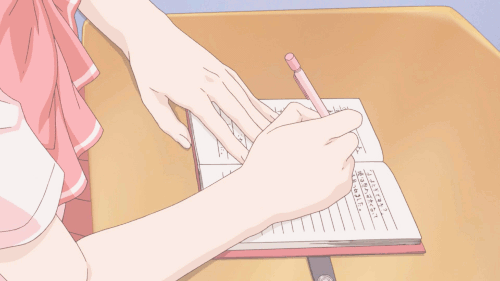
Hi! I have a very short attention span, and I have never really been able to make it through a course or textbook without giving up straight away, so I have never really been able to learn languages in the traditional way. I also very easily get bored with learners material, so I mostly stick to native material to consume my target language. Here is how I do it at the beginner level!
I usually start off with an app to learn the basics of the alphabet, vocabulary and grammar. Most of the times, I use Duolingo. I rarely get past the first few units before I jump into native material. Still, this is a good jumping off point.
When I start with native material, I usually use YouTube videos (with subtitles in the target language), and focus on spoken language, because spoken language is less overwhelming, and involves less complex language and grammar. At this point, I find that books are far too dense and complex for me to handle. Others might enjoy the challenge. My current favourites for this are LingoPie (for French, Spanish, German, Italian and Russian) and Viki (for Korean, Japanese and Mandarin Chinese).
I learn the most important words and phrases as I go. I do NOT look up every word, unless I can understand at least 70% of the language. For this, I will try and write the words and phrases down, and memorise them. I might use a flashcard app too (Anki is my fave, but Quizlet and Memrise are good too). For languages like Japanese and Chinese that have lots of characters to memorise, I will use an app (wanikani and chineasy are my faves). I always make sure that I know how to pronounce and understand each word or phrase.
I will start texting native speakers in my target language on apps like Tandem and HelloTalk. I look up words as I go, and will ocasionally try speaking.
I start shadowing (i.e. repeat after native speakers, imitating the intonation and pronunciation). I use Easy Languages for this.
After a while, I start reading. I’ll usually start with wikihow articles, or fluentu articles in my target language. I’ll write down new words, test myself on them until I get them correct, and then put them into anki to review.
After a while, I’ll formally study some grammar. I’ll usually use a textbook for this. However, I don’t necessarily do it in a traditional way. I go through the entire textbook and make a cheat sheet which condenses all the information in it to a few pages. I’ll review it regularly, and do LOTS of writing practice. For irregular verbs, I’ll just use flashcards, and write them down repeatedly.
Then, I’ll get a speaking buddy (I usually find one on discord) and speak with them a few times a week.
After a while of doing all of this, I start reading fanfiction (usually translations of my faves). It’s difficult, but I try to read intensively (i.e. look up every word).
At this point, I start journaling, and posting on the website journaly.
I’ll listen to podcasts like innovative languages, coffee break languages and language transfer. These are usually good for learning about grammar.
I start intensively reading serious content once I feel like I’m at a confident B1 level. I would suggest using proper newspapers (like le monde for French or BBC for English) and try studying one article daily. After a while, you can start reading a YA book (try something you’ve never read before in any language). Study it chapter by chapter fairly intensively, and then reread it again and again until you understand the story. After you’re finished with a chapter, put the new vocabulary into an app and review fairly regularly.
At the B1 level, listen using two sources: intermediate podcasts and native material. Intermediate podcasts are usually labelled as such, and are IN the target language, but about various topics, like culture or history (innovative languages have some, for french there is inner french, piece of french, news in slow french and RFI:Savoirs, for Spanish there is dreaming Spanish and news in slow spanish, and for Korean there is Iyagi). For native material, continue watching youtube videos about topics that interest you, and consider watching both the news and films/TV shows.
At this point you should be able to construct gramatically correct (mostly - if you still have problems then go through a grammar course, or work through a textbook) and fairly complex texts. I would suggest now learning some essay phrases and writing an essay. You’ll be terrible at first, BELIEVE me, but the more you practice the better you get. You could also start trying to write fanfiction (tip: use full phrases you have found in other books or fanfiction).
Continue doing what you are doing (reading intensively and widely, speaking with your buddy, listening, writing essays and short stories) and I think that after a while you will be able to say you are conversational in another language.
Thanks for reading this post! I hope it was useful! (Also haha ig my break from langblr is over lol).
#studyblr#langblr#study tips#language learning#study advice#languages#studyspo#self study#french#russian#korean lesson#korean blog#learning korean#learning languages#learn languages
2K notes
·
View notes
Text
Korean Word of the Day
증명
Proof
21 notes
·
View notes
Text
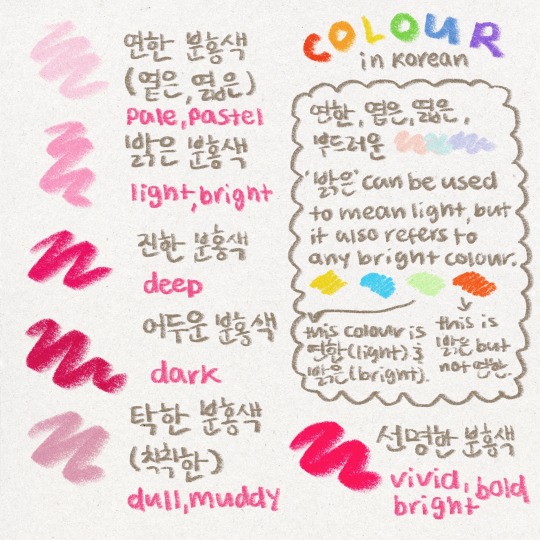
색깔 한국어로 표현하기 expressing colour in Korean
#langblr#studyblr#korean#한국어#these are notes so there may be mistakes :)#koreanblr#study#learning korean#language#language learning
127 notes
·
View notes

